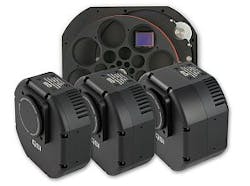The RS Series full-frame and interline transfer CCD cameras are available from 768 × 512 pixels to 8.3 Mpixels. Designed for life science and research applications, the cameras feature dual read rates up to 8 MHz with high-speed USB 2.0 interface, deep cooling >45°C below ambient, and full 16 bit pixel depth.
Quantum Scientific Imaging
Poplarville, MS
www.qsiimaging.com
More Products
-----
PRESS RELEASE
Quantum Scientific Imaging, Inc. today announced the addition of the QSI RS Series of deep cooled CCD cameras to their award-winning family of scientific cameras.
The QSI RS Series features a broad range of full-frame and interline transfer CCDs from 768x512 pixels up to 8.3MP. A variety of options and accessories are available making the RS Series ideal for a wide variety of life science and research applications including Fluorescent Microscopy, Gel Documentation (Geldoc), Chemiluminescence, Spectroscopy, drug discovery and protein analysis.
Dual read rates of up to 8 MHz with high-speed USB 2.0, deep cooling to greater than 45C below ambient and full 16-bit pixel depth allow QSI RS Series cameras to produce high quality images with high frame rates, extremely wide dynamic range, excellent linearity and exceptionally low noise.
RS series cameras are available with no-coverglass CCDs and fused silica windows for maximum transmission across a broad spectrum of light, from as low as 240nm in the ultraviolet (UV) through the visual band up to 1100nm in the near infrared (NIR). Electronic input and output triggers with latency as low as 5µsec allow precise exposure timing and triggering of external events such as strobes. RS 4.2 and RS 2.0 models support Particle Image Velocimetry (PIV) exposure mode for flow visualization with two exposures as close together as 100µsec.
Cooling on the RS Series is achieved with a custom 2-stage thermoelectric cooler (TEC) providing regulated cooling to greater than 45C below ambient, or greater than 50C with the optional Liquid Heat Exchanger.
QSI cameras are renowned for providing exceptionally low noise and wide dynamic range. QSI cameras are relied upon today by leading commercial organizations, universities and government research labs around the world. QSIâs proprietary ResearchSpec⢠profiling includes full Photon Transfer Curve (PTC) and FFT analysis of every camera to ensure the highest possible image quality, performance and reliability.
All QSIâs world-class scientific cameras are proudly designed and manufactured in the United States. QSIâs headquarters and manufacturing facility is located in southern Mississippi, not far from New Orleans and NASA Stennis Space Center.
QSI RS Series cameras can easily be attached to a wide variety of microscopes and other instruments. Even with the mechanical shutter and available internal 5 or 8-position color filter wheel, careful mechanical design and minimal back focus allows the use of DSLR lenses using the available Nikon F-mount and Canon EOS lens adapters. Standard C-mount and T-mount adapters are also available.
The QSI RS Series offers extensive software support including camera control with LabVIEW⢠and a MATLAB Image Acquisition Toolbox Driver. Windows COM and Linux application programming interfaces (API) are included with all QSI RS Series cameras enabling users to write custom camera control applications.
QSI RS Series cameras represent an exceptional value for a 16-bit, deep cooled scientific camera. OEM configurations are available. Reseller inquiries are invited.
-----
Follow us on Twitter
Subscribe now to Laser Focus World magazine; it's free!
Sponsored Recommendations
Sponsored Recommendations
Request a free Micro 3D Printed sample part
April 11, 2024
How to Tune Servo Systems: The Basics
April 10, 2024
Voice your opinion!
Voice your opinion!
